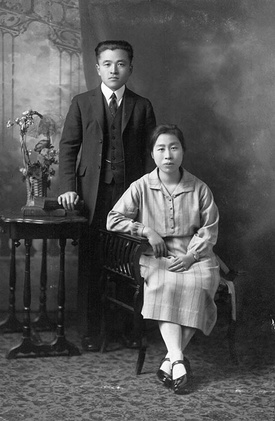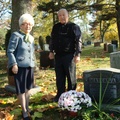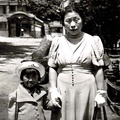Read Part 1 >>
Remembering ‘Okasan’ and ‘Otosan’
My mother, Jun Ogawa was 8 years younger than Dad. She was born a Buddhist and was forever a Buddhist but she wanted us children to be Christians (she respected other religions also) as we were living in a Christian country and would blend into the Canadian society easier. I think she was helping out in the United Church as she often made reference of what Rev. Kosaburo Shimizu was always doing. She always referred to him as Shimizu Sensei, teacher.
She was teaching public school in Hose, Japan before she was married. Although she was a very short person, she had a very loud voice which carried and was a good communicator and told us many stories. Most of the history of Japan I learned was through her so when I visited Japan later I felt comfortable going there and was able to associate places and things I encountered there.
The best story I heard was about the time when she took her whole class to the local village hotel where an Englishman was staying. She obtained permission to visit as nobody had ever seen a “white man” before. She observed the children’s reactions and these were some comments she heard:
“Oh, look at his red face, it’s like a monkey’s!” (Japanese macaque monkeys do have red faces!)
“Look at all the hair on his body, even on his back—he is a monkey”
“He is so tall, he’s a giant”
“Oh, he smells so awful, does he ever take a bath?” (Japanese custom is to take bath every day) etc.
Isn’t this funny—white man calls a yellow man monkey and yellow children calling a white man a monkey too. People didn’t have to do all those name calling—after all, we were all monkeys it seems!
Whenever Mom went to see Japanese movies, after supper the next day, she would tell us the whole story which may take a week as she acted everything out, even wiping her tears while talking (most Japanese movies were sad stories). She would explain every scene, why it’s done this way and that way explaining all the background noises used—all the sounds and visual special effects that were used, etc. I noticed that the Japanese language’s use of onomatopoeia gave the best way of describing effects of actions by sound amongst all the languages known. They can describe just about any actions and no other language has as many as the Japanese.
Yes, the Japanese language is very powerful and Mom used it to its fullest. To express your thoughts and feelings in different ways you can strengthen or lower the pitch/tone of the words spoken and use your facial expressions along with body languages to get exactly what you are trying to convey. Several times our Toronto neighbours told me that as they watched and heard Mom and her across the street friend, Mrs. Kamada, greeting each other in the morning while sweeping their porches, they didn’t understand the language but even they felt good. I saw that too and they had such loud jovial laughs together echoing back and forth, I felt good too! They sure knew how to express themselves in a warm way.
The way the language was built men talked in a very strong masculine way and ladies talked in a very refined feminine way and even the words used were different.
Even the different dialects used were more masculine or feminine. Like the ‘Kishu-ben’ was more masculine as the area was populated by fishermen and the ‘Goshu-ben’ business people were extremely feminine and were known as “sissy talk”. It’s so hilarious when men talk the sissy talk!
Now in Japan, they have standardized the language and when we go for a visit to Japan, it seems to them as if a ghost of the past has returned because our Issei forefathers passed on the old dialects and thinking to us which we retained while Japan’s way has changed through the years! Anyway, I use to marvel at my mother’s skills and knowledge of everything from soup to nuts.
Mother was such a very good cook too and nothing ever tasted good anymore after she passed away.
(I’ve been married for 54 years and I confessed to Susan that 25 years later I forgot all this about Mom’s cooking and Susan’s cooking now tastes the best. One thing the present day people will never match is the sushi Mom and all the Issei used to make; it was so good and delicious the present day sushi became inedible and I found out it became “bad” in Japan too. To be fair, the ingredients the Issei used are now rare and, if available, very expensive.)
© 2013 Frank Maikawa






